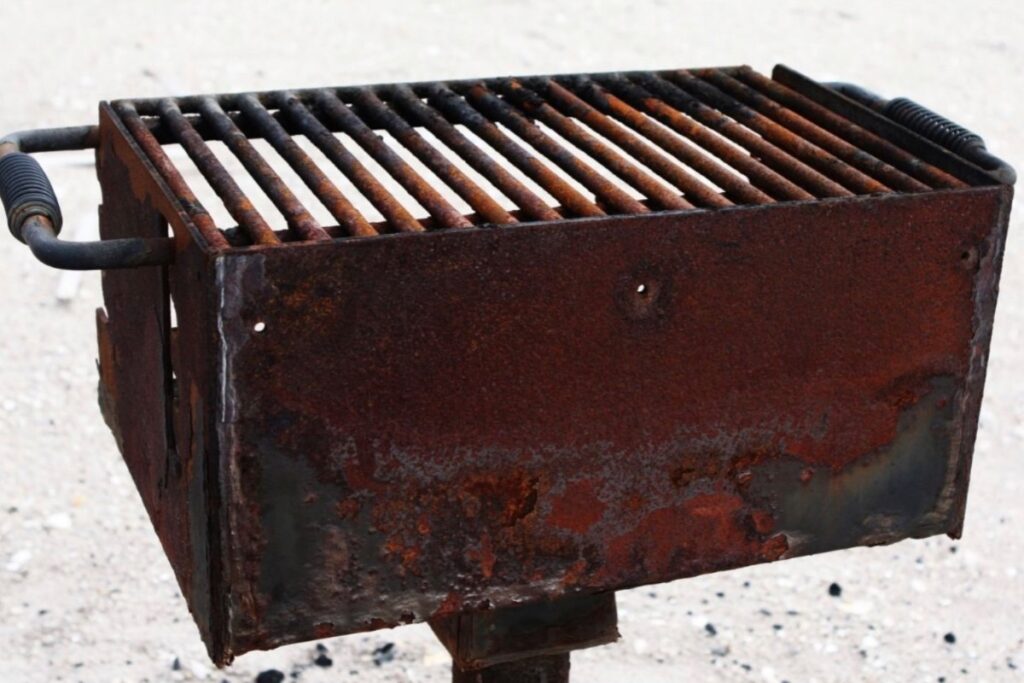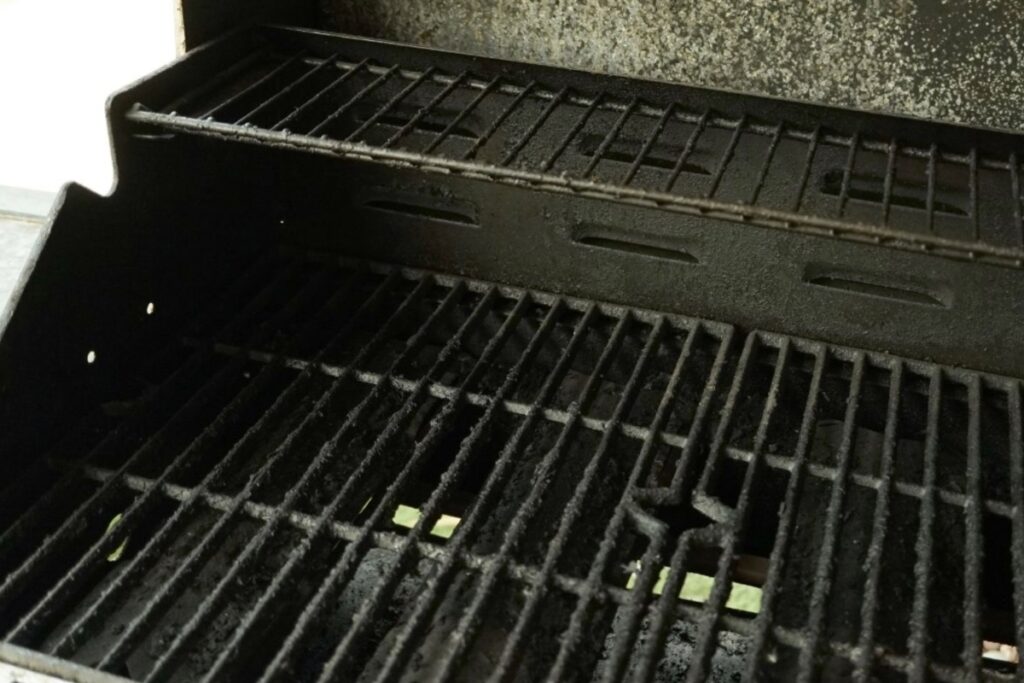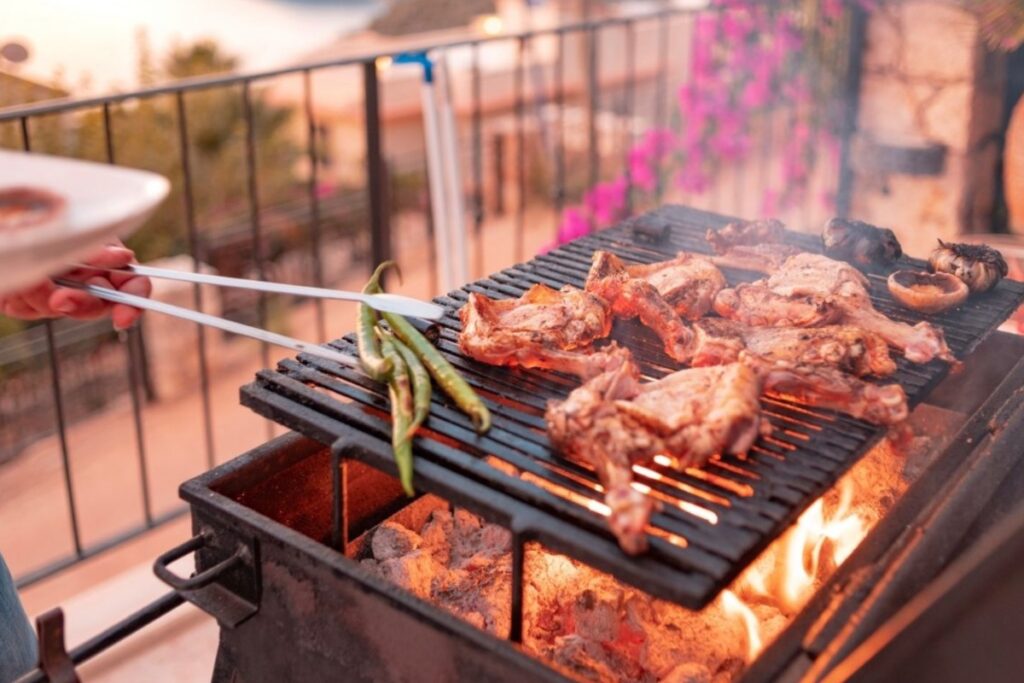One of the worst things about owning some form of grill or oven is when rust and grease get stuck to your appliance’s features.
It seems that whenever you feel like you need a good grilled meal most, is when you notice a build-up of thick rust or grease within your machine.
A lot of people may accept defeat and think of replacing their cooker, however, there are more viable options that won’t require you to leave a gaping hole in your bank account.
What is rust? How do we get rid of it? Follow our guide to find out all the information you need to know.
What Is Rust?
Rust is an iron oxide compound that forms on cast iron cookware over time due to exposure to moisture and heat.
As with any other metal, once exposed to air, oxygen will combine with the iron atoms to create rust. This process can be accelerated by certain chemicals, such as salt or acid.

Chemicals And Rust
A lot of the chemicals that can facilitate the formation of rust include :
- Salt
- Acidic foods
- Alcohol
- Grease
- Vinegar
- Water
Water
The chances are, you will have seen rust form of some sort of metal when it has been left outside for long periods at a time. This is probably the most common way that rust can form when rain falls and affects the integrity of certain metals.
This rust can be removed sometimes, but after a certain amount of time, it will become increasingly harder to get the job done.
Salt
When cooking food, salt is often used to season dishes. However, if you use too much salt, it can cause corrosion.
If you want to make a special effort to avoid this, then you can always avoid using salt when cooking. However, for a lot of people, the right amount of salt can make or break a food dish, so this may not be a viable choice.
A lot of the time, rust can form when stuck-on foods, remain untouched after cleaning, and will start to corrode the metal inside of your cooker.
Features of a grill, like cast-iron grates, can get salty foods stuck to them and may cause rust. The longer you wait to clean your appliance, the harder it will be to recover your cooker’s quality.
The formation of rust is not harmful to the item itself, but it does affect its appearance and performance. When food items are cooked in a rusty pan, they often develop a metallic taste.
If left unattended, this rust formation will increase and get a lot harder to deal with. It works the same way with cookers like grills and smokers.
The Worst Foods That Can Cause Rust
When cooking, the foods with higher fat and salt levels can be potentially damaging to your cooker if they aren’t dealt with straight away.
Certain foods, like steak, can often leave behind a residue of cooked fat and salt content. These fats and salts can stick to the surface of your cooker and cause rust to form.
Cooking with acidic ingredients can also lead to the formation of rust. Citrus fruits contain citric acid which can react with the iron atoms in your cooker and cause the metal to rust. These foods can include anything with lemon or lime, fresh fruits like pineapple, and even tomatoes.
If you don’t remove these residues from your cooker immediately, they can cause damage to the metal and lead to rust forming.
You should try and keep these types of foods away from your cooker until you’ve cleaned them thoroughly. Cleaning your cooker more frequently can help to stop these formations before they have a chance to form.

What is Rust?
Rust is an oxidation process caused by water molecules reacting with oxygen on the surface of a metal.
The chemical reaction creates tiny bubbles on the surface of the metal and as the bubbles grow larger, they begin to separate from the rest of the liquid and float to the top.
As the bubbles rise up through the liquid, they release small amounts of gas into the air. This causes the bubbles to expand and burst, leaving behind a layer of solid material called oxide.
Oxide is just another name for rust and is used throughout the scientific side of things.
The colour of rust varies depending on what type of metal it has formed on. For example, red rust is created when iron oxidises.
Darker colours indicate that there is more iron present. White rust indicates that there isn’t enough iron present to create white rust. Brown rust is created when zinc oxidises.
Where Can I Find Iron Grates?
When it comes to cooking appliances, iron grates can be found all over the place. They’re often included in outdoor barbecue kits and are commonly used in indoor ovens and stoves.
Their popularity means that they come in many different sizes and shapes so you’ll find one that suits your needs perfectly.
This also gives rust more options to pick its target. Iron grates are very easy to clean because they’re made out of cast iron. Cast iron is porous and allows moisture to pass through easily.
As long as you wipe down your grate regularly, you shouldn’t need to worry about rust building up too much. Although it may seem like you’re doing more work, you’re actually using less effort when cleaning more frequently.
This is because cast iron is naturally non-stick and will not attract any food particles. If you want to make sure your grill doesn’t get stuck, you can use a grill brush to scrub off any excess grease or oil, making your job easier.
How Do I Prevent Rust Form?
Depending on what type of grill you have, you may use your cooker more frequently than other appliances in your home. Giving your cooker a quick clean with paper towels and some hot water can go a long way.
However, be sure not to mix the warm water with electricity because it can be potentially dangerous for anyone coming into contact.

How To Remove Rust, Your 5 Step Guide
What You’ll Need
For this task, you need to make sure that you have the right equipment to tackle rust and grime. You will need vinegar, baking soda, soapy water, and a form of steel brush, scraper, or steel wool. On top of this, you may opt for a trash bag to help clean the mess and will need vegetable oil too.
Step One – Washing Your Grates
Wash your iron grates before soaking them. This will help to remove any loose residue and excess residue that may be easier to get off. This will make your future vinegar and baking soda solution more effective and easier to have an effect.
Whilst washing your grates, use your steel brush to remove the dirt that may be stuck between the grates. If you don’t have access to a steel brush, then using some aluminium foil can also do the trick!
Step Two – Soaking Your Grates
Time to turn into an amateur chemist! Combine a bottle of vinegar with a cup of baking soda and let the grates soak for at least an hour. Depending on the amount of rust that has formed, you may wish to let your grates soak for longer.
You can even leave the grates overnight, or for a few days, if the rust formation is particularly large. This process will start to break down the rust particles and the iron in the rust. This will make your job a lot easier in the end.
Using a steel brush, you should be able to now scrape off the residue quite easily. If it’s still hard to do, then you need longer.
Step Three – Oven Cleaner
If the other steps haven’t been too effective, then you can always try using an oven cleaner. This is a chemical that will thoroughly clean your grates.
Make sure that you use this spray in a ventilated area for the best results and ensure that all of the grates are covered evenly.
Place the grates in a trash bag and seal the bag fully. Make sure to keep away from children and animals. Then rinse with warm soapy water after this has been completed.
Step Four – Place Inside Of The Oven
Once you’re sure there is no moisture left, your grates can go back in the oven. Make sure they are fully dry and turn your oven to low heat to help with the drying process.
Step Five – Re-Season Your Grates
The final step to this task is to heat your grill to around 350 or 400 degrees Fahrenheit. Apply some vegetable oil to the grate surface with a cloth, but make sure that you don’t apply too much.
After every half, an hour, take the grates out and reapply your oil until the grates are back to their shiny selves!
Final Thoughts
Cleaning your iron grates doesn’t have to be the mountainous task that you may originally think. Having the right set of tools down to the last cloth or set of paper towels is the best way to start thinking about tackling this job.
Mixing warm water with soap and having some white vinegar is always a plus when cleaning charcoal grills or some other form of the cooker.
Repeating this task regularly will avoid the building of rust and will ensure that you spend less time cleaning your cooking appliance and more time enjoying the food it produces!
- Porterhouse Vs. Ribeye - May 16, 2022
- How Long To Smoke A Brisket Per Pound – Explained - May 16, 2022
- What Is A Tomahawk Steak? - May 16, 2022








